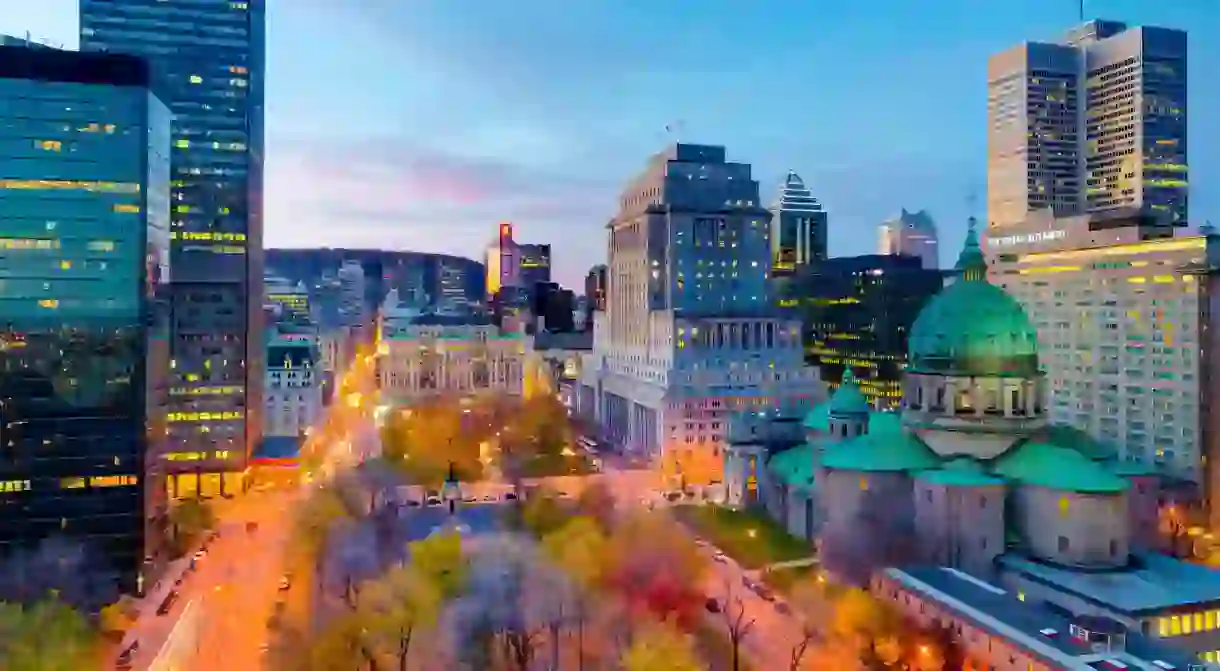The Most Beautiful Buildings in Quebec City

Quebec City is the capital of French-speaking Canada and one of the most important cities in the province of Quebec. Founded as a fur-trading settlement on the icy shores of the St. Lawrence River by Samuel de Champlain in 1608, the architecture of Quebec City reflects its mixed colonial history. Here are some architectural highlights of the country’s most historic city.
Fortifications of Quebec
A key feature of the Upper Town of Old Quebec, the Fortifications are a designated National Historic Site that reveals the city’s military past through both the French and British colonial regimes. These massive walls, originally built in the early 1600s, consist of approximately five kilometers (eight miles) of stone ramparts that also incorporate four impressive stone gates. Visitors can explore the walls and get a broader, bird’s-eye view of the old city.

La Citadelle
Offering beautiful views of the St. Lawrence River, La Citadelle is a fort with star-shaped fortifications that now houses military memorabilia and artifacts. The French started the construction of the fort in 1750, but much of it was subsequently built by the British between 1820 and 1850 in order to defend the city from possible invasion from the United States. La Citadelle is the largest military fortification in North America, and highlights include guided tours, a museum area, and regular changing of the guard ceremonies during the warmer months.
Basilique-Cathédrale Notre-Dame-de-Québec
Set in the Latin Quarter of the Upper Town, the Basilique-Cathédrale Notre-Dame-de-Québec, established in 1633, holds the status of being the oldest parish church in the New World north of Mexico. Fire destroyed the church twice, and it suffered through military attacks during the conflicts between the British and French armies in 1759. Its current form came to be in 1925, reflecting the neoclassical style of its origins.
L’Hôtel du Parlement
One of the most notable landmarks in Quebec City, the Parliament building sits in the St. Jean Baptiste District and features landscaped gardens. The Parliament building, built in the Second Empire style that was popular between 1877 and 1886, remains an important political hub for the province today. Quebec’s fleur-de-lis flag flies atop the 52-meter-tall (170.6 feet) clock tower of the National Assembly building. Along the façade, visitors can see 24 statues of important historical figures, including French explorer Jacques Cartier and Quebec City’s founder, Samuel de Champlain.

L’Hôtel de Ville
Quebec’s City Hall, complete in 1896, is also an example of the Second Empire style, with classical and medieval elements incorporated into its design. With the Notre Dame Basilica by its side and Château Frontenac in the background, L’Hôtel de Ville comprises part of the iconic and much-photographed vignette of Quebec City architecture, with its towers and turrets.
Place Royale
With construction dating back to the beginning of the 17th century, the Place Royale in Quebec City is one of the most historic landmarks in Canada. Composed of a series of buildings and streets, the Place Royale makes up an important area of Old Quebec, which is the most visited district in the city. The area is home to a number of boutiques, cafés, restaurants, and shops. Don’t miss the Notre-Dame-des-Victoires church, which is the oldest stone church in North America (1688).
Château Frontenac
Standing atop the escarpment of Cap Diamant and overlooking the city’s Upper Town, the impressive Fairmont Le Château Frontenac dates back to 1893. A designated National Historic Site since 1980, this Neo-Château-style structure is generally recognized as the most photographed hotel in the world. A prominent feature of the Quebec City skyline, the Château Frontenac incorporates numerous towers and turrets, making it look like a fairytale castle in any season.
Did you know – Culture Trip now does bookable, small-group trips? Pick from authentic, immersive Epic Trips, compact and action-packed Mini Trips and sparkling, expansive Sailing Trips.













